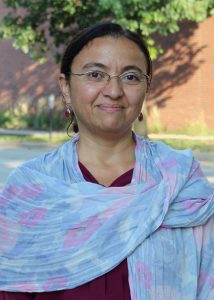 The Associate Professor of Library Administration and the Middle East and North Africa subject specialist in the International Area Studies Library at the University of Illinois Urbana-Champaign, Laila Hussein Mustafa, along with team members/colleagues Teresa Barnes (Director of the Center for African Studies) and Mauro Nobili (History Professor) have received funding for their project from Discovery Partners Institute (DPI).
The Associate Professor of Library Administration and the Middle East and North Africa subject specialist in the International Area Studies Library at the University of Illinois Urbana-Champaign, Laila Hussein Mustafa, along with team members/colleagues Teresa Barnes (Director of the Center for African Studies) and Mauro Nobili (History Professor) have received funding for their project from Discovery Partners Institute (DPI).
DPI is a pioneering new research institute led by the University of Illinois System that will create breakthrough discoveries to drive economic growth and prosperity in Chicago, the state of Illinois and beyond. The selected proposals were among those that best supported DPI’s mission and guiding principles of collaborative work that addresses 21st-century grand challenges to produce real-world impact.
Mustafa and her team’s project is titled “Developing ‘Scholarly Gaming Environments’ Via Digital Conservation of African Cultural Heritage.” The primary goals of the project are the development of innovative educational products in gaming and/or virtual reality formats and the digital conservation of vulnerable African sites and materials.
“I am happy to receive the DPI award and honored to be part of the growing community of researchers working on these important topics of Education and Gaming. I am looking forward to this great opportunity to contribute to the profession and collaborate with my colleagues Terri, Mauro and others,” said Mustafa.
Funding from DPI will provide for two workshops to gather interested faculty and industry partners who will discuss the direction of the project. Along with funding, all projects will receive staff support and use of the DPI facility in Chicago — intended to fuel the development of these early-stage initiatives into full-scale research and education programs.
This project will convene a preliminary meeting and two workshop conversations at Discovery Partners Institute in Chicago in 2019-20 with Illinois-based computer science faculty, practitioners of 3D imagining technology, game theorists, artists and video game development companies to begin developing a new product: historically accurate and compelling “scholarly gaming environments” on African historical themes. The workshop conversations will decide what specific forms the products should take, the kind of content they might encompass, the cultural heritage sites and materials which should be prioritized, and a development timeline.

